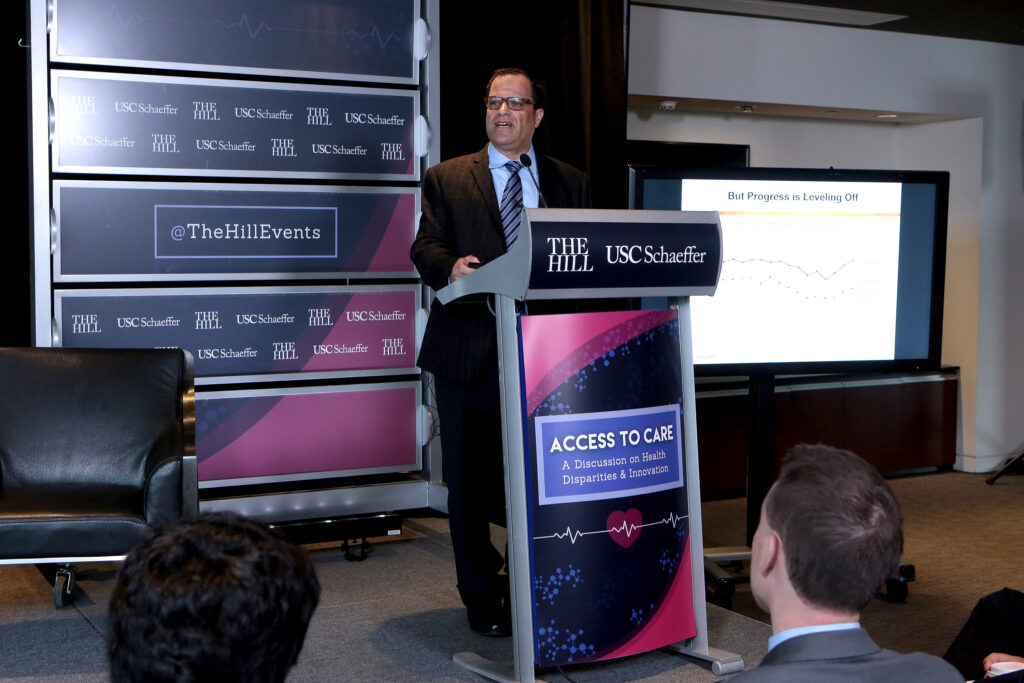The next Administration should prioritize increasing access to health care, especially for minorities and under-served communities, according to experts assembled on Tuesday for a discussion on health disparities and innovation.
The discussion before an audience of 150 at the Newseum in Washington D.C. was presented by The Hill and sponsored by the USC Leonard D. Schaeffer Center for Health Policy & Economics. It sought to find common ground between the twin objectives of enhancing access and encouraging innovative treatments.
Dana Goldman, director at the Schaeffer Center, argued that new treatments for heart failure are a good example of how innovation can lengthen lives and narrow disparities. He noted that an estimated 5.7 million American adults suffer from congestive heart failure, which is a contributing factor in one in 9 U.S. deaths. The disease has an outsized impact on minorities. About 1 in 4 black women aged 45 to 75 is at risk for heart failure, compared to 1 in 7 white women.

All women need to be aware of the risk, said Mary McGowan, CEO of WomenHeart, the National Coalition of Women with Heart Disease. She noted that one in five women with heart disease are misdiagnosed at emergency rooms.
Some effective new treatments are now available, Goldman said, but unless they become more widely adopted the heart failure rate is predicted to double by 2030.
Getting low income and minority patients access to doctors is the critical first step, said Ramanthan Raju, president and CEO at the New York City Health and Hospitals Corporation. Despite a big increase in Medicaid enrollment as part of the Affordable Care Act, “a concern for all public health systems is how do we fund care for the [millions of] undocumented and others who are uninsured.”
He ticked off a litany of prior failures to improve access and health outcomes in minority communities, including diversifying workforces and improving cultural competencies. Raju said he has concluded that major progress won’t be made until overhanging social and economic conditions improve. “It doesn’t help the patient if he gets treated for diabetes but gets shot outside the hospital,” he said.
Samantha Artiga, director of the Disparities Policy Project at the Kaiser Family Foundation, said the South runs the risk of falling further behind in health outcomes because so many states in the region declined to expand Medicaid enrollment under the ACA. African Americans are twice as likely as whites to fall into the resulting coverage gap between Medicaid and subsidized ACA insurance plans, she said.
Mark Hlatky, professor of Health Research and Policy at Stanford, said new drugs can help cut into disparities, “but just having the drug out there doesn’t mean it gets taken.” The health system is fragmented and incentives at one level may not align with incentives at another.
“There is an enormous challenge in just getting minorities up to the current standard of care,” said Paul Ginsburg, director of public policy at the Schaeffer Center and Senior Fellow at the Brookings Institution. “If we try to bring a lot of innovation to bear, will we hurt the effort to eliminate disparities?”
“We need to work as a unit to solve this problem,” said Amy Rudolph, a vice president and health economist at Novartis, the Swiss pharmaceutical firm. “It is better for everyone if we can avoid hospitalizations.”
Contrasting views of the impact of the Affordable Care Act were presented by J. Nadine Gracia, director of the Office of Minority Health at the Dept. of Health and Human Services, and Sen. Bill Cassidy (R-LA).
Gracia lauded the Act for driving the uninsured rate below 9 percent, including marked gains among minorities, and for making preventative services available to millions at no cost.

Cassidy, who is the co-author of a new bill that seeks to repeal all the ACA mandates and replace subsidies with a tax credit, said the ACA was failing because it is not affordable. “When poor people run up against a $6,000 deductible, it may as well be $6 million,” he said.

You must be logged in to post a comment.